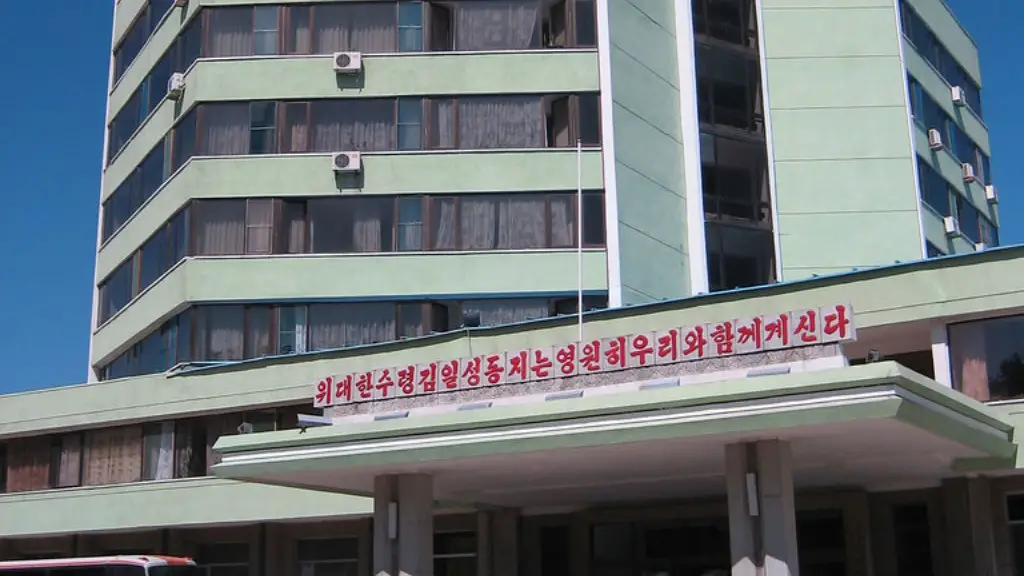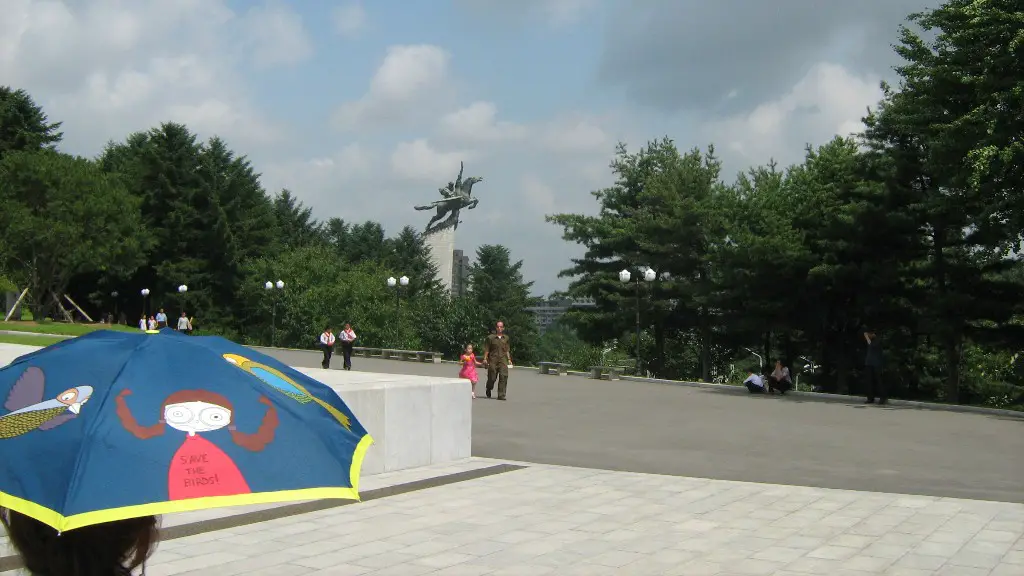Background Information
North Korea has been subject to worldwide criticism due to its human rights abuses and nuclear programme, making it a controversial state on the global political stage. In 2006, after its first successful nuclear test, sanctions have been placed on North Korea by various countries and international organizations. There has since then been a wave of economic and diplomatic punishment, with countries across the world imposing a range of different sanctions. The United Nations is the most-involved entity in the sanctions process, with the Security Council tasked with enforcing punitive measures through the implementation of various resolutions.
Relevant Data
The European Union has a comprehensive sanction list for North Korea that includes an arms embargo, financial restriction and a ban on dual-use items. The United States has also imposed economic sanctions, as well as travel bans and asset freezes. Other countries that have implemented sanctions against North Korea include Japan, South Korea, Australia, Canada and Switzerland.
The measures implemented by the countries and international organizations have been aimed at curbing North Korea’s nuclear programme and other illicit activities. The sanctions have been designed to put pressure on the ruling Kim family and the Workers’ Party of Korea to abandon their aggressive foreign policy and nuclear ambitions. However, there have been reports of North Korea’s continued flouting of the sanctions and pursuing of their nuclear agenda, with some allegations of North Korea engaging in smuggling operations of goods that are used to fund their projects.
Perspectives from Experts
Experts have expressed their views on the effectiveness of the sanctions placed on North Korea. Some have argued that the sanctions are necessary in order to control the nuclear programme, while others are sceptical about their impact. Scholars say that in order for sanctions to be effective, there must be a clear and coherent strategy with a strong political will to implement them. Moreover, there needs to be relentless enforcement and enforcement measures need to be escalated if necessary.
But some experts argue that the sanctions are not enough, and that there should be more done in terms of diplomatic measures, such as direct dialogue and engagement in order to resolve the conflict. Others have warned that the sanctions could lead to an escalation of tensions and could even push North Korea to resort to more extreme and dangerous measures.
Insights and Analysis
It is clear that different countries have very different views when it comes to the sanctions against North Korea, and there is no sign that all countries are willing to come to an agreement on this issue. Therefore, the main challenge is finding a balance between tough sanctions and diplomatic dialogue that would allow all countries to reach an understanding on how to tackle this situation.
It is also important to consider the impact that sanctions can have on the people of North Korea. While the sanctions are aimed at the regime, it is the everyday people who ultimately bear the brunt of the economic punishment. Therefore, it is important to ensure that the sanctions are targeted and well-designed in order to minimise their impact on the citizens of North Korea.
Economic Impact of Sanctions
The economic impact of the sanctions placed on North Korea is undoubtedly significant, with reports indicating that their economy experienced an annual contraction by 3.5% in 2016. This has resulted in a decrease in trade, restrictions on capital and investment, and a decrease in the value of the North Korean won vis-a-vis the US dollar.
The sanctions have had a trickle-down effect, leading to a decrease in the standard of living, and has caused shortages in basic necessities such as food and healthcare. There have also been reports of severe economic mismanagement, rampant corruption and inefficient government subsidies, which has only exacerbated the country’s economic woes.
The sanctions have also led to a reduction in foreign aid, which has adversely impacted the country’s population. Since the implementation of the sanctions in 2006, there has been a lack of access to food, medical supplies and other necessities. In addition, the lack of foreign investment and technology has hampered the development of the country’s infrastructure and industry.
Political and Diplomatic Effects of Sanctions
The unilateral sanctions placed on North Korea have drawn criticism from some quarters, with many scholars arguing that the sanctions have not accomplished their intended goal of curbing the nuclear programme. This has led to questions about the effectiveness and impact of the sanctions.
The political and diplomatic effects of the sanctions have also been significant. North Korea has been isolated on the global stage and its foreign policy is largely limited. In addition, the sanctions have had a negative impact on humanitarian organisations and NGOs operating in North Korea, as they are unable to get access to the necessary resources to do their work.
The sanctions have also exacerbated the tensions between North Korea and the rest of the world. This has led to a further deterioration of diplomatic relations and a decrease in the level of communication between the two sides. It has also hampered the international community’s ability to find a peaceful solution to the conflict between North Korea and its neighbours.
Evaluating the Effectiveness of Sanctions
The effectiveness of the sanctions on North Korea has been hotly debated. Critics of the sanctions have argued that they have not caused the desired behaviour change and have even increased the difficulty of finding a diplomatic solution to the situation. However, supporters of the sanctions believe that they have helped exert pressure on the ruling Kim family and the Workers’ Party of Korea to abandon their nuclear ambitions.
In addition, the sanctions have helped to bring about some level of disclosure in terms of North Korea’s economic structure. For example, the UN has reported that North Korea has been profiting from illicit activities such as drug trafficking and sanctions evasion, as well as from the use of overseas networks. This has helped to give the international community a better understanding of the North Korean regime and its activities.
All in all, the sanctions have not yet achieved their full desired outcome, and it is difficult to judge the effectiveness of the sanctions. However, it is clear that the sanctions have had a significant impact on North Korea and its people, and further work needs to be done to make sure that they are properly enforced and have the desired effect of curbing the Kim regime’s nuclear programme.
The Role of China in North Korea Sanctions
China is North Korea’s largest trading partner and a key ally, and has thus been integral in the enforcement of sanctions. China has traditionally been reluctant to fully abide by the sanctions and in some cases, has been accused of actively breaking the sanctions and providing aid to North Korea.
However, in recent years, China has taken a more active role in enforcing the sanctions, and is increasingly viewed by the international community as a responsible actor. China has been supportive of UN sanctions and has implemented unilateral sanctions, although it has so far resisted calls for tougher measures against North Korea.
In addition, China has been supportive of UN-led initiatives to foster dialogue and negotiations between North Korea and the international community. These initiatives have been largely successful, and have led to high-level negotiations between the two sides. China has also been instrumental in brokering deals to aid North Korea in developing its economy, and in recent years has been eager to help North Korea join the global economy.
The Impact of Sanctions on North Korea’s Nuclear Programme
The sanctions imposed on North Korea are designed to force them to abandon their nuclear programme and put an end to their illicit activities. However, it is difficult to judge the impact of the sanctions on the nuclear programme. The regime has continued to pursue its ambitions, despite the mounting pressure from the international community.
There are reports of North Korea continuing to engage in activities that are outside the scope of the sanctions, such as acquiring technology and resources for their nuclear programme. Therefore, it is clear that the sanctions have not been able to stop them from developing their nuclear capabilities, and they are still able to acquire the necessary technology and resources to continue their programme.
Furthermore, it is argued that the sanctions have caused a decrease in foreign aid and humanitarian assistance, which could ultimately lead to increased suffering for the people of North Korea. Therefore, it is important to consider the humanitarian impact of the sanctions, as well as their effectiveness in deterring the regime from pursuing their nuclear ambitions.
The Impact of Sanctions on North Korea’s Human Rights Abuses
The sanctions imposed on North Korea are also intended to put pressure on the regime to stop its human rights abuses. However, it is difficult to judge the effectiveness of the sanctions in this regard. While the sanctions may have helped bring about some change in terms of access to humanitarian aid, there are still widespread reports of human rights abuses in North Korea.
In addition, the sanctions are not designed to address the actual perpetrators of human rights violations, and the regime has continued to carry out its abuses with impunity. Therefore, the sanctions have not been able to bring an end to the regime’s widespread human rights abuses, and further measures need to be taken if there is to be any genuine improvement in the situation.
Conclusion of Sanctions on North Korea
The sanctions placed on North Korea have been complex and controversial, and have had a significant impact on North Korea and its people. The sanctions have had a mixed effect – while there have been some positive results in terms of shedding light on the country’s economic structure and its activities, it is difficult to judge the effectiveness of the sanctions in curbing the country’s nuclear programme and bringing an end to its human rights abuses. Moreover, the sanctions have caused widespread suffering for the people of North Korea, and further work needs to be done to ensure that their impact on the citizens is minimised.


